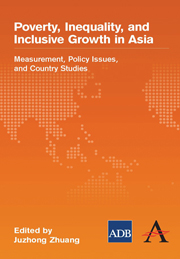Book contents
- Frontmatter
- Contents
- Foreword
- Preface and Acknowledgments
- Contributors
- Abbreviations, Acronyms, and Symbols
- Tables, Figures, and Boxes
- 1 Poverty, Inequality, and Inclusive Growth in Asia
- Part A Measuring Inequality and Poverty
- Part B Selected Policy Issues for Inclusive Growth
- Part C Country Studies
- 9 Growth, Inequality, and the Labor Market: The Philippines
- 10 Poverty and Inequality in Nepal: An Empirical Analysis
- 11 Decomposing Income Inequality: People's Republic of China, 1990–2005
- 12 Evolution of Income Mobility: People's Republic of China, 1991–2002
- 13 Occupational Segregation and Gender Discrimination in Labor Markets: Thailand and Viet Nam
- 14 Inclusiveness through Food Security: The Philippines' National Food Program
- Index
12 - Evolution of Income Mobility: People's Republic of China, 1991–2002
from Part C - Country Studies
Published online by Cambridge University Press: 05 March 2012
- Frontmatter
- Contents
- Foreword
- Preface and Acknowledgments
- Contributors
- Abbreviations, Acronyms, and Symbols
- Tables, Figures, and Boxes
- 1 Poverty, Inequality, and Inclusive Growth in Asia
- Part A Measuring Inequality and Poverty
- Part B Selected Policy Issues for Inclusive Growth
- Part C Country Studies
- 9 Growth, Inequality, and the Labor Market: The Philippines
- 10 Poverty and Inequality in Nepal: An Empirical Analysis
- 11 Decomposing Income Inequality: People's Republic of China, 1990–2005
- 12 Evolution of Income Mobility: People's Republic of China, 1991–2002
- 13 Occupational Segregation and Gender Discrimination in Labor Markets: Thailand and Viet Nam
- 14 Inclusiveness through Food Security: The Philippines' National Food Program
- Index
Summary
Introduction
Although average income has shown remarkable growth in the People's Republic of China (PRC) in the past few decades, income inequality has also increased noticeably in recent years. This increase has been subject to considerable research and concern. However, perhaps a more pertinent question for households and individuals over the longer run is not so much the disparity of income across households in a given year, but rather the degree of income mobility: would they be perpetually stuck in the lower economic rungs or would they have a reasonable chance to scale the economic ladder? The conventional use of annual income to measure income inequality may provide a misleading indicator of enduring income inequality in societies where there is considerable year-to-year income mobility. Income mobility may mitigate the impact of widening income inequality reflected in annual cross-section data over a longer period.
Studies on income mobility in the PRC are still relatively few. One reason is that income mobility can only be measured when panel data on individuals or households are available. An important aspect of this analysis is to use observations on income to determine the degree to which income inequality in a given year is smoothed through income mobility over time (Gottschalk 1997, Fields 2001). Nee (1996), one of the earlier studies on income mobility in the PRC, provides evidence that income mobility among rural households increased in the latter years of 1978–1989.
- Type
- Chapter
- Information
- Poverty, Inequality, and Inclusive Growth in AsiaMeasurement, Policy Issues, and Country Studies, pp. 387 - 408Publisher: Anthem PressPrint publication year: 2010
- 1
- Cited by



